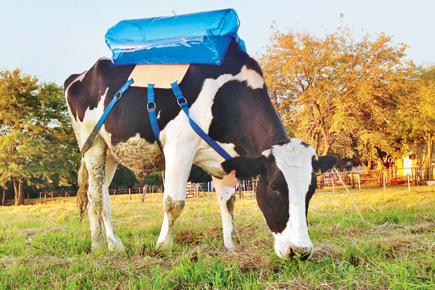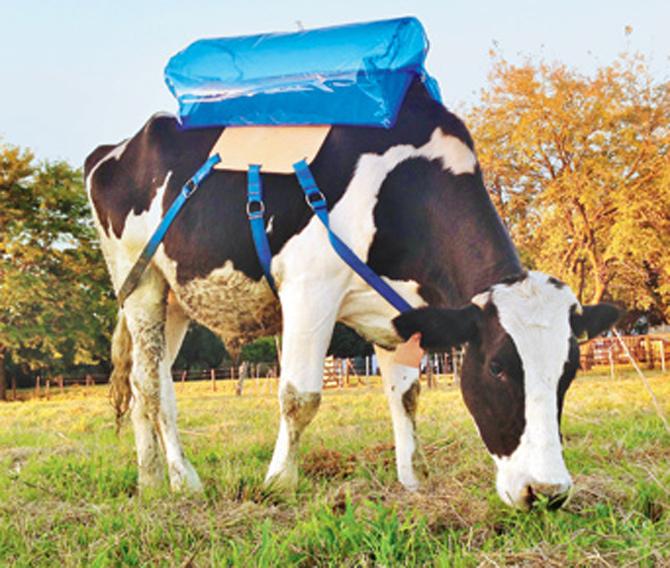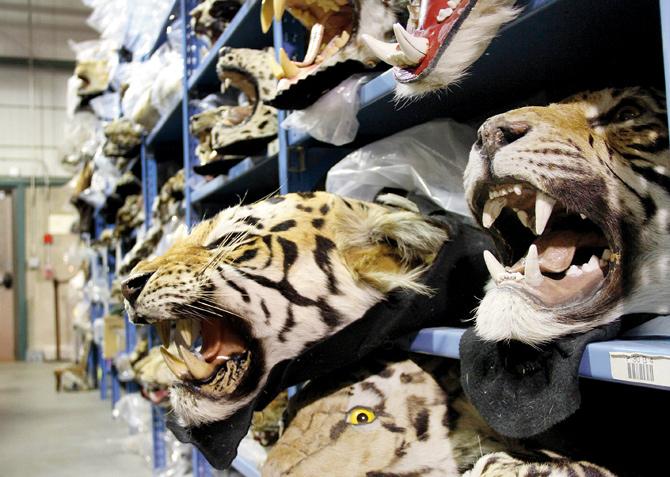Louie Psihoyos's documentary, Racing Extension premieres tonight and raises burning questions about how our actions are impacting the planet

Cows emit methane gas, 22 times more potent than carbon dioxide
![]() Q. How did the idea of Racing Extinction come about?
Q. How did the idea of Racing Extinction come about?
A. I have a background in paleontology. I did short stories on the Mesozoic, that’s the midlife of the planet. I wrote a book on paleontology. In the book, there’s a chapter on mass extinction. Six years ago, when I began work on my movie, The Cove, I had no idea that we were going through a mass extinction at the moment. A friend, Michael Novacek wrote a book called Terra in which he talked about how we’re losing species now faster than mankind’s ability to record the reason on the planet. Through The Cove, I wanted to create awareness on this. Then with my interest in activism, I wanted to use the film as a platform to try to change how we are doing business with the planet. If we don’t act now, I don’t think other generations are going to forgive us for our current actions. Therefore, I felt this is a story that needs to be told and this was something that pinched me after I made The Cove. I didn’t have the chance to do it then.
ADVERTISEMENT

Cows emit methane gas, 22 times more potent than carbon dioxide
Q. For the documentary, your team of artistes and activists infiltrated black markets. Where did it take you? What links did you find between carbon emissions and species extinction?
A. We infiltrated many illegal wildlife markets in China and the United States; it was risky. We didn’t think about it so much when we were doing it. It’s scarier after you leave, and you think how that was crazy. But we helped bust several rings selling endangered shark species in China. There’s a town called Puchi, and we closed down six of the seven illegal shark operations there. We also busted restaurants in the United States that sold whale meat. We visited Mexico, Indonesia, Hong Kong, Thailand, Argentina, and Tonga amongst others. One thing that we did at my organisation, the Oceanic Preservation Society, is that we converted our cars to electric cars; we’ve had four of them now. When I’m in town, I don’t pay for gasoline. I have an electric car that’s powered by solar panels. It has 120 solar panels that generated a 140% of energy, which means that in December, the darkest month of the year, I still got cheques from the electric company.

The US is the second largest consumer of wildlife products after China. Many of them (like these tiger skins) end up at the National Wildlife Property Repository in Colorado, US. PIC courtesy/Ethan Johnson
Q. A lot is being said about carbon emissions at the Paris climate talks. The developing and the developed nations don’t agree. What are your expectations from the talks with regards to conservation of endangered species? How are carbon emissions linked with extinction of species?
A. It’s why we’re coming out with Racing Extinction on December 2 because it’s the time when world leaders from 170 countries will be gathered and decide on climate change. They’re not doing enough, but it’s amazing that they’re all together. The good news is that all the countries that are there have now agreed that steps need to be taken. That didn’t happen in Rio. It didn’t happen in Copenhagen. There was too much disagreement. Now, we’re all in agreement. The accord is going to be signed, and we won. We’re not making big enough steps, but we should focus right now and celebrate the idea that it’s a start. We can start figuring out how much each country should adjust their carbon production.

Louie Psihoyos, Environmentalist filmmaker
Q. What role can an individual play in protecting the species?
A. The most important thing anybody can do is to change their diet, if they are eating meat. We know, for a fact, that our ancestors did not survive on meat alone. We have the dentures, we have the biology that we’re primarily plant eaters.
Q. Has failure to reach a unanimous decision with respect to climate change and each nation's responsibility led us to the current scenario where we are staring at the extinction of over half of the species on earth by the end of this century?
A. What we’re trying to do with this film is to create a constituency so that our politicians are empowered to do the right thing. Right now, a lot of the politicians are in the back pocket of the oil oligarchy, the oil companies. In America, we’re very divided on climate change, but 60% of Republicans believe in climate change, they’re just scared to react. Once we have a constituency for them, they’re going to do the right thing because they’ll understand that they have to. Politicians need to eventually bend to the will of the people. They should be scared of people, not the other way around.
Q. Do you see the current situation as a fight for survival with humans at one end and the rest of the living world on the other side?
A. A meteor killed the last dinosaurs, but this time, humanity has become the meteor. This new epochs is called the Anthropocene, the age of man, and the aim of this movie, what we’re trying to do is not just create the awareness that we’re going through this extinction of the Anthropocene. I want to create a movement so we can create the solutions to prevent it. So that in fifty years, we’re not looking at ourselves and saying, why didn’t we do enough to try to solve this problem?
Because our own species – Homo sapiens – means the wise ones. How wise it when one species is causing, you know, some scientists say 30,000 species a year to go extinct? By the end of this century, we could lose half the species on the planet. The idea is to prevent a mass catastrophe from happening.
Q. What difficulties did you face during research?
A. When I started out, I was aware that things were going on in our oceans. Every time you return to the same dive site, whether it’s the Galapagos or Papua New Guinea, it gets steadily worse. But what I did not realise is that the rate of the acidification. The burning of fossil fuels doesn’t create more carbon dioxide in the atmosphere, but third to half of that gets absorbed by the oceans.
We spent about a month preparing to get into shark processing plants in Hong Kong. We posed as businessman on a culinary tour looking for exotic products. Usually, we are a group of the same people who get try to get in but get kicked out or thrown out; but now, we pose as businessmen, we enter through the front door and get the A tour.
Q. Carbon credits have, unfortunately, proven to be a tool for the rich countries/big corporates to get away with their responsibilities in climate change by, doing more harm than good. Do you believe that such a tool shouldn't have existed in the first place?
A. The most important thing is that any industrialized country can do, whether its China, Japan or the United States is enact laws. In China, while they were working with a couple of other organizations, they got together and made these public service announcements. Now, with the support of celebrities like basketball icon Yao Ming, sale and consumption of shark fin soup has dropped 70% in the last few years and it's falling further. National laws are being enacted as well. It is now illegal to serve shark fin soup at any government function in China. So, that was huge. We need laws like that all throughout the world because all of these incredible species that are hanging on, hooked by their fins and talons. Sharks have been around for 400 million years. They survived four mass extinction events, but they might not survive humanity. We’ve lost 90% of the sharks in the generation that I've been alive.
On the endangered list: European mink, wolf, grey whale, rhino, snow leopard, bearded vultures
 Subscribe today by clicking the link and stay updated with the latest news!" Click here!
Subscribe today by clicking the link and stay updated with the latest news!" Click here!






